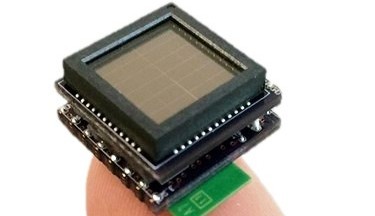Power Management for IoT Devices
August 25, 2015
on
on

Cypress Semiconductor Corp have announced a family of power management ICs designed for use with low-power IoT connected devices deriving power from tiny solar cells and optional primary batteries. In a typical setup, energy from a solar cell is stored in a capacitor and the S6AE101A monitors the voltage to turn on a power switching circuit, supplying regulated energy to a load when the capacitor voltage is within a preset maximum and minimum range. The chip also has an input for primary cells to delivery backup auxiliary power when power from the solar cells is not sufficient.
According to Kiyoe Nagaya, vice president of Cypress' analogue business unit, "The most compelling wireless sensor nodes that will drive IoT growth are self powered, can be deployed anywhere for more than 10 years and require minimal deployment and maintenance costs, Cypress offers a complete solution that enables developers to create solar-powered WSNs for batteryless IoT devices."
The power management IC draws just 250 nA and can start up with an input power of just 1.2 microwatts. This allows even small amounts of energy generated by compact solar cells to be harvested and provide useful power in low-light environments of 100 lx. For application development Cypress has a $49 kit which includes a S6AE101A together with a EZ-BLE PRoC module for Bluetooth and supporting software.
According to Kiyoe Nagaya, vice president of Cypress' analogue business unit, "The most compelling wireless sensor nodes that will drive IoT growth are self powered, can be deployed anywhere for more than 10 years and require minimal deployment and maintenance costs, Cypress offers a complete solution that enables developers to create solar-powered WSNs for batteryless IoT devices."
The power management IC draws just 250 nA and can start up with an input power of just 1.2 microwatts. This allows even small amounts of energy generated by compact solar cells to be harvested and provide useful power in low-light environments of 100 lx. For application development Cypress has a $49 kit which includes a S6AE101A together with a EZ-BLE PRoC module for Bluetooth and supporting software.
Read full article
Hide full article


Discussion (0 comments)